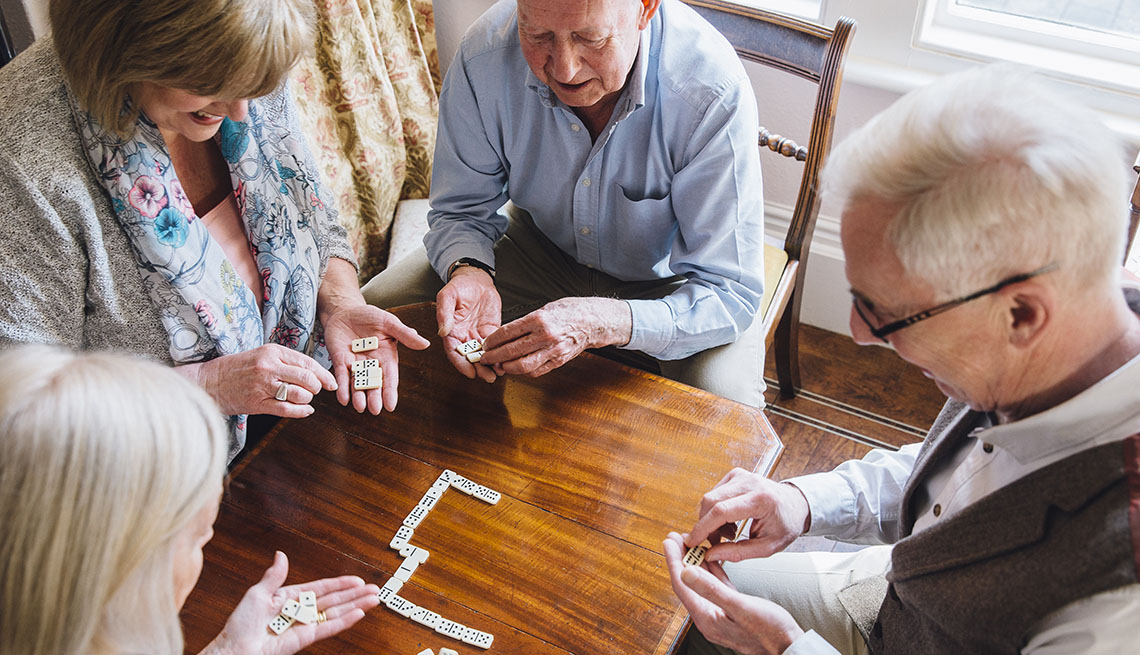Memory cafes helping people with dementia stay social
Memory cafes helping people with dementia stay social"
- Select a language for the TTS:
- UK English Female
- UK English Male
- US English Female
- US English Male
- Australian Female
- Australian Male
- Language selected: (auto detect) - EN
Play all audios:
Sharon Kleinhelter started noticing changes in her husband, J.P., in 2007, but he did not receive an official diagnosis of mid-stage Alzheimer's disease until 2012, when he was age 66.
At the time, he was still working at his Indianapolis construction business, had many friends and was very outgoing. From that point on, Kleinhelter tried to ensure that her husband
continued socializing. But as the disease progressed, it became more difficult to take him out into the community. “J.P. was a very social, friendly, nice guy. I couldn't control him.
As nice as he was, he could be disruptive,” she recalls. “He automatically touched people's arms, and some don't like that. He was just friendly. He couldn't talk quietly and
couldn't sit still for long. When he wanted to go, I had to go, too. It became too hard.” Then, Connor Prairie, a living history museum that recreates 19th-century life in Fishers,
Indiana, where the couple lived, began offering a memory café — a social program for those living with dementia and their caregivers. “For J.P., I think it was just that safe place to go to
where it didn't matter if he said the same thing over and over and over again,” Kleinhelter says. “Everybody understood, so that made me comfortable, too.” ANTIDOTE TO ISOLATION Bère
Miesen, a Dutch psychiatrist, is credited with creating the first memory café in the Netherlands in the late 1990s to raise awareness of and fight stigmas associated with dementia and to
provide support for patients and their caregivers. After spreading across Europe, the concept took root in the United States in 2008, according to Dave Weidderich, founder of the Memory
Café Directory, which catalogs and provides information on such meeting spots. Weidderich’s site now lists more than 1,000 in-person and virtual memory cafés across the U.S. and in four
other countries. They are held in restaurants, coffee shops, hospitals, libraries, museums, schools, colleges and universities, community and senior centers, senior living communities, and
faith-based organizations. All offer socialization, and many hold events centered around history, music, dancing and other subjects. Memory cafés are not a form of respite care. Rather, they
offer a place where caregivers and care recipients can socialize and connect with others in similar situations. J.P. Kleinhelter passed away in June 2020. As she looks back on her
caregiving experience, Sharon Kleinhelter realizes how isolated she became while caring for him. “I wish people could know from the start of the diagnosis that memory cafés are available for
them,” she says. “It lets them know they’re not alone in this caregiving and they know they have a safe place to go.” As a longtime caregiver for my dad, Robert, who had Alzheimer’s and
lived with me for several years before his death in June 2018, I understand the challenge of providing socialization.
Trending News
My take | the us is priming asia-pacific for warThe war in Ukraine has not caused mainland China to invade Taiwan, but it has provided a cover for Washington to double ...
The page you were looking for doesn't exist.You may have mistyped the address or the page may have moved.By proceeding, you agree to our Terms & Conditions and our ...
3 overlooked problems with working from homeMemorial Day Sale! Join AARP for just $11 per year with a 5-year membership Join now and get a FREE gift. Expires 6/4 G...
Three up, three down: manny machado heats up; tempers flare in another brawlA look at what’s trending this week in Major League Baseball: 3 UP CASHING IN: Manny Machado’s walk-off home run against...
African national congress (anc) news, research and analysis - the conversationApril 11, 2025 Vinothan Naidoo, _University of Cape Town_ and Brian Levy, _Johns Hopkins University_ South Africa’s gove...
Latests News
Memory cafes helping people with dementia stay socialSharon Kleinhelter started noticing changes in her husband, J.P., in 2007, but he did not receive an official diagnosis ...
New chatter on dark matterDark matter has worked its way back into the news in the last few days with the completion of a detection experiment in ...
Pitcher plant's ingenious way of trapping antsThe carnivorous pitcher plant lures insects to their doom with drops of nectar. South American pitcher plants have devel...
On giant’s shoulders: new cinema history dissects texas tropesIn 1956, America was ascendant, and Texas was America. Eleven years after the end of World War II, the greasy machinery ...
How could jeremy corbyn behave so stupidly? | thearticleDid Jeremy Corbyn call Theresa May a “stupid woman”? Yes, of course he did: not only have a long list of lip-readers, le...
